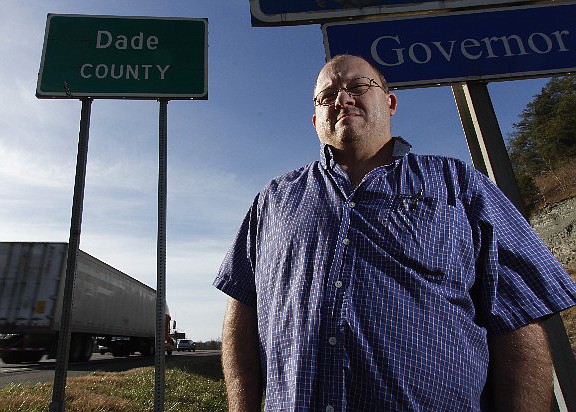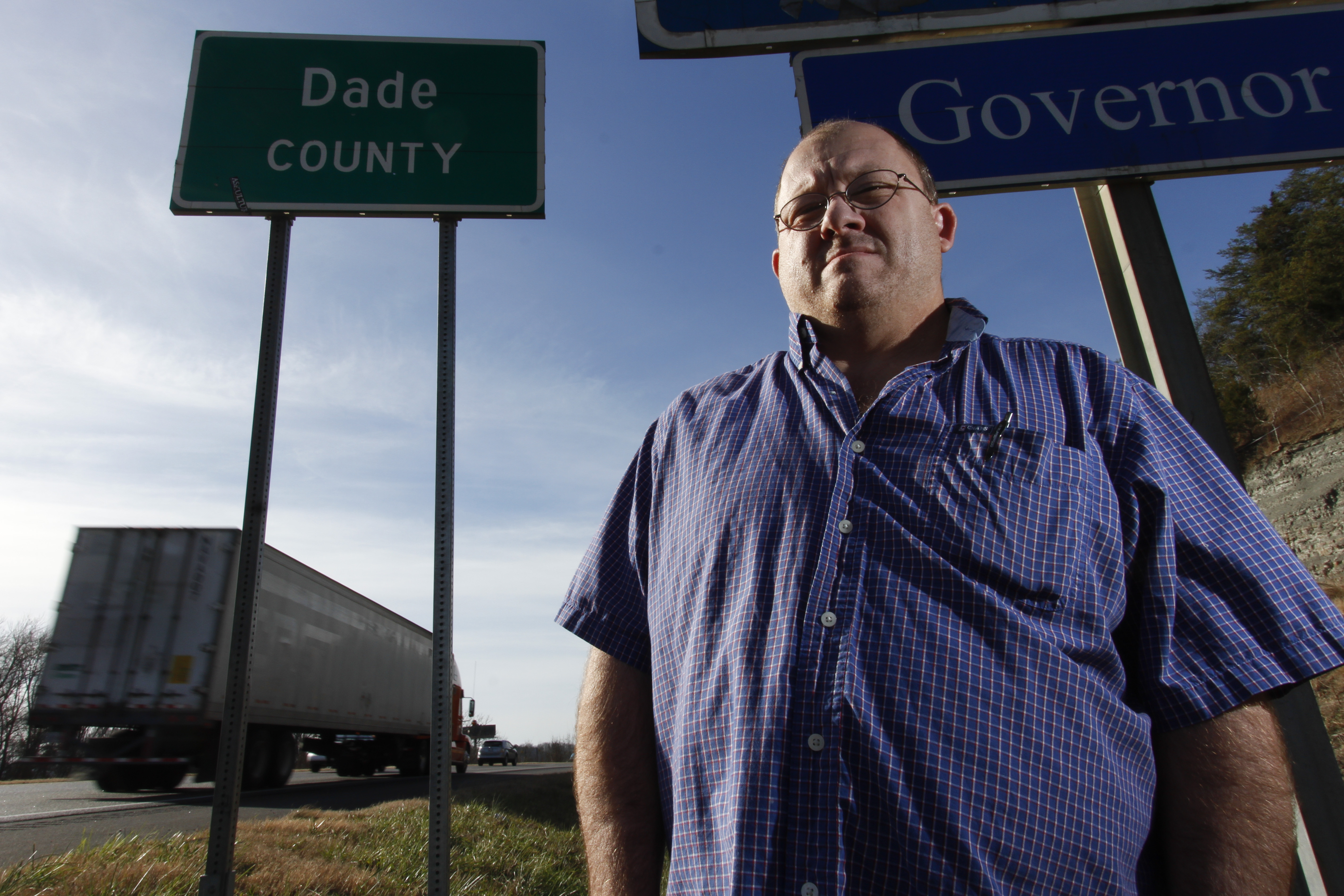He's a menace, an outlaw, a bad man. The law told him to get out, and stay out. Don't come back now, you hear?
But on Thursday morning, in a field just off the shoulder of Interstate 24, Les Coffey stood at the edge of illegal. About 50 feet from the line that separates Tennessee from Georgia, Coffey walked toward Dade County and the land from which he has been banished.
Limping, he was 30 feet away now. Cars and tractor-trailers barreled past on the highway. He dragged his right foot slowly through the dead grass, shifted his weight onto that leg, then snapped his left foot out front, a sad stride -- the product of a broken back from falling off a 20-foot-high dock in a warehouse last year.
"Walking, standing, sitting: Much of any activity kills me," Coffey, 46, said. "Activity hurts. I hate to say it."
He was 20 feet away, then 10, then right there, right next to a pair of signs, one welcoming him to the Peach State, the other simply reading "Dade County." He stopped at the line, turned around and posed for a picture.
"It's not [just] Dade," Coffey said. "I'm banned from the Lookout Mountain Judicial Circuit."
And he says it's all because officials don't like him.
For the next seven years, Coffey cannot enter any of the four counties that make up the circuit: Catoosa, Chattooga, Dade and Walker. This, police say, is because he stole from someone, and because he indirectly damaged a road, a fire department and a water drainage system during another incident.
Coffey pleaded no contest to those charges in Walker County Superior Court on Dec. 2. The banishment is a condition of that plea, a condition Coffey and many other defendants in Georgia have agreed to. If Coffey comes back to one of those four counties, police can arrest him for violating his probation.
State officials don't track how often citizens like Coffey get banished. The Georgia Department of Corrections does not keep a database on banished citizens. District Attorney Herbert "Buzz" Franklin's office doesn't either. But banishment happens enough in Georgia to draw attention, and debate.
People get banished for all sorts of reasons. Child molesters, prostitutes and burglars get banished. So do drug dealers. So do drug users. So do people who get angry and threaten to hurt others.
The debate is about whether banishment creates an "us vs. them" society. And if banishment is OK, to what extent? Should prosecutors be allowed to kick lawbreakers out of our towns, our counties, our states, our countries?
On one side, some law enforcement officials say banishing people like Coffey from a county -- or several counties -- is an effective punishment. Banishment pushes those criminals away from their old friends, giving them a chance to start fresh. It also assures that victims never have to run into the criminals who hurt them.
"Sentencing is not all about what's best for the defendant. Sometimes sentencing is about what's best for the community at large or a specific victim," wrote Kelly Burke, the former district attorney in Houston County, "the banishment capital of Georgia," which has banned more than 400 of its citizens.
But opponents of banishment say the practice is unconstitutional. A banishment can strip you of the right to travel. And it can separate you from your family, perhaps the people you need most. And it creates a criminal shuffle -- one county pushes its criminal to another county, which pushes those criminals to yet another county.
"I was amazed that Georgia still did this," said McNeill Stokes, an Atlanta lawyer who has unsuccessfully tried to appeal two men's banishments. "It's freakish. ... It tears you away from everything that's valuable."
The Georgia Constitution addresses banishments in its Bill of Rights. Prosecutors can banish people, so long as they don't kick them out of the entire state. Georgia is one of 16 states with a constitution that prohibits or at least restricts the practice.
Tennessee is another one of those 16. Article 1, Section 8 of the Tennessee Constitution says that a person in the state cannot be exiled except by a jury of his peers.
There are no official statistics concerning the frequency of banishments from Georgia or Tennessee or any other state, so it is difficult to compare.
Even if banishment is acceptable in theory, the scope of banishment is up for debate. In 1957, the U.S. Supreme Court ruled in Albert Trop vs. John Foster Dulles that kicking military deserters out of the country was unconstitutional. Chief Justice Earl Warren argued that national banishment would destroy a person.
"It is a form of punishment more primitive than torture," he wrote.
In Georgia, statewide banishment has been illegal since 1877. Still, banishing people from whole counties has remained in effect as a condition of probation, and Stokes said some prosecutors have used this tool to essentially force people out of Georgia, even if they haven't technically kicked them out.
Sometimes, a prosecutor will banish a defendant from 158 of Georgia's counties, forcing that defendant into the only remaining county. This happened to Gregory Terry, who pleaded guilty to aggravated assault, aggravated stalking and five other charges in Douglas County in 1995.
Terry was sentenced to 20 years in prison and 10 years on probation. During those last 10 years, he could only live in Toombs County. In 2008, Stokes challenged this punishment, calling it "de facto banishment" from the whole state. But the Georgia Supreme Court upheld that prosecutors can banish a defendant from 158 of 159 counties.
"The whole thing's calculated just to make you leave to another state," said Stokes, who represented Terry in an appeal. "They basically practice primarily what is called 158-county banishment."
In 2006, Georgia lawmakers altered the banishment rule. Now, if a defendant is banished, he can't be banished to just one county. But he can be banished to one judicial circuit, a block of land in which one district attorney presides.
For practical purposes, Stokes said, this does not make much of a change. Some judicial circuits -- like that of Lookout Mountain -- consist of multiple counties. But 14 judicial circuits in Georgia are made up of just one county. And of those 14 judicial circuits, 12 are surrounded by other Georgia judicial circuits.
If you get banished to one of those 12, you are essentially on an island. Leave that county -- heading north, south, east or west -- and you are breaking the law.
In Coffey's case, he is free to travel through most of Georgia. He just can't return to the Lookout Mountain Judicial Circuit. He says Franklin and assistant district attorney Chris Arnt had him banished because he is a political opponent.
Coffey says he is one of five founders of the LaFayette Underground, a blog that often criticizes Northwest Georgia government officials. Coffey was also often at odds with Rossville officials when he managed Peerless Woolen Mill across the street from City Hall.
In June 2010, police say, Coffey stole machine shop equipment from one of the mill's tenants. Then, one month later, Coffey accused another tenant of stealing from him. He also said Rossville Police Department Chief Sid Adams helped.
Coffey applied for warrants against Adams and David Rowan, the other tenant. Adams was not charged, and Rowan was not prosecuted.
Then, in November 2010, police say, Coffey destroyed city property. Coffey allegedly hired one of his employees to throw chunks of concrete into the sewer system that ran under the mill. The blocks flooded the sewer system, and the flood damaged a road, a water drainage system and the city's fire department.
Coffey denies this happened. He says city officials set him up because they didn't like him. Still, he doesn't mind the punishment.
He has homes in Chattanooga and North Carolina and did not have to sell any land as a result of the decision, nor does he have family in the district. He stopped working in Rossville in 2011.
"Banishing me from that area is like them taking someone that was in East Berlin in the '60s and chucking them over the wall," he said. "Chucking them over to the West, you know what I mean? That's how asinine that whole thought process is. Banishing someone from an area like that? What difference does it make?"
In this breakup, the feeling is mutual.
"He's been pretty much a constant problem," said Franklin, the district attorney. "We'll let some other jurisdiction deal with him."
Contact staff writer Tyler Jett at 423-757-6476 or tjett@timesfreepress.com.

